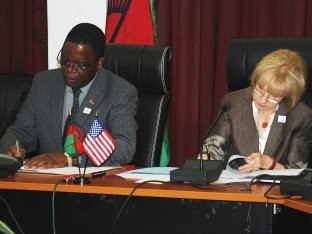
Lilongwe, Malawi
Today we celebrate the historic partnership between the United States of America and the Republic of Malawi. At this ceremony we mark the signing of bi-lateral agreements between The United States Agency for International Development and Malawi’s Ministry of Finance and Development Planning for programs in education, health, economic growth, democracy and good governance. This cooperation is implemented through NGOs, international organizations and Government of Malawi partnerships that support Malawi’s own development priorities.
For more than 50 years we have worked together for the good of all Malawians. Throughout Malawi’s recent history I am proud to say that the United States has remained a steadfast partner as the largest overall donor.
Currently, Malawi benefits from all five of the U.S. Presidential initiatives: PEPFAR, the President’s Malaria Initiative, the Global Health Initiative, Feed the Future and the Global Climate Change Initiative. To give you an idea of our level of assistance, in 2011 USAID provided $172 million to advance health, education, economic growth, and democracy in Malawi, and this does not include generous donations to international organizations such as Global Fund and United Nations organizations.
While we continue to provide assistance under these initiatives and other programs, we know that Her Excellency the President Mrs. Joyce Banda is concerned about the immediate issue of food insecurity in the southern part of the country. You can be assured that the United States is working closely with a very engaged Government of Malawi and donor team to meet the challenges of this food security problem. Thus far USAID has allocated $14 million in food aid and stands ready to provide other assistance.
Ladies and Gentlemen, it is my honor and privilege to stand at the side of the Minister of Finance Dr. Ken Lipenga, a friend and collaborator of the United States whose singular goal is to make Malawi a better place. He has been at the forefront of the key drivers of our partnership and we appreciate his collaboration, determination and wise counsel.
I would now like to reflect on several principles that must be in place for our partnership to succeed. And I should emphasize that in the long run, “success” means that, in the future, Malawians will assume ownership of development, and say, “This is now our issue that we must address with our people and our resources.”
First, good governance and respect for human rights. We applaud this government’s progress and urge continued vigilance to strengthen institutions that are vital to this democracy and to ensure that all citizens of the Warm Heart of Africa enjoy fundamental human rights.
Second, sound economic policies. We have confidence that Malawi will stay the course on its economic recovery plan. Staying the course is essential – not for us, but for Malawi. Our assistance can only be successful if the local and international private sector is given space to invest and expand, only if trade is stimulated by improved policies and processes, and only if government budgets are well-managed to the benefit of all Malawians. This is a very difficult period in this country’s history. Turning around an economy which was, I must say, about as bad as it could get, is painful. But Her Excellency publicly stated yesterday that Malawi will not turn back.
Third, transparency and accountability. In a democracy and a free market economy, transparency and accountability are simply essential. What does that really mean? Well, for example, tax payers in the United States have access to information on how every dollar is being spent in Malawi, and want to see it being used wisely and to good effect. That’s a very clear example.
And lastly, corruption must be attacked at every level – from the marketplaces to the medical shelves, and from the border crossings to the board rooms. Corruption is a disease that could kill all the great efforts to move this country forward to meet the President’s vision of moving from aid to trade. Fighting corruption is a task for every citizen.
In conclusion, the Government has an economic recovery plan that must be aggressively implemented, it is pursuing stronger institutions and better social services, and it has committed to being accountable and fighting corruption. Donors including the United States are committed and are doing their part.
So -- let’s run together for Malawi. Limodzi ti kutukula dziko la Malawi. Zikomo Kwambiri. (Together we are lifting up Malawi. Thank you very much.)







Comment
Make a general inquiry or suggest an improvement.